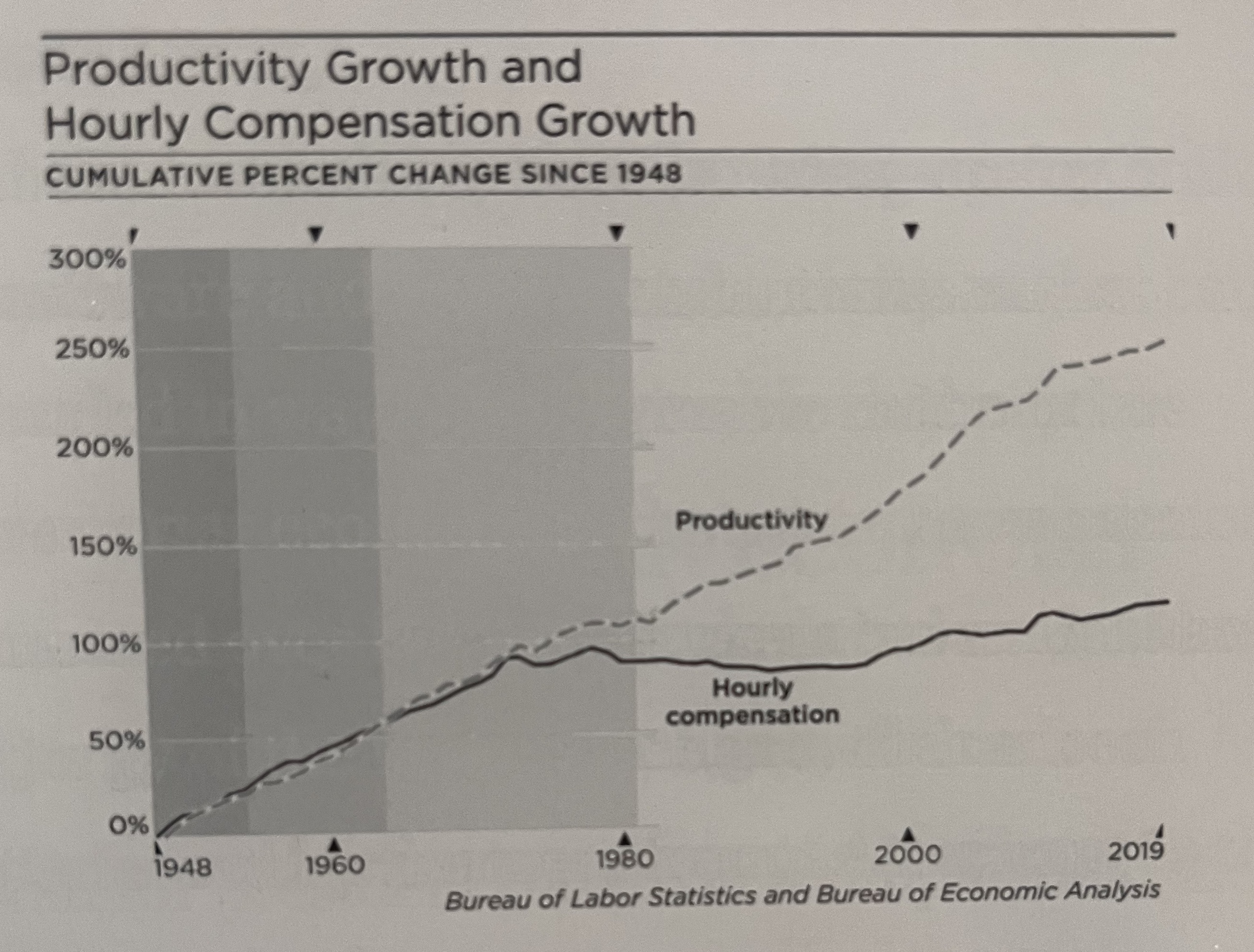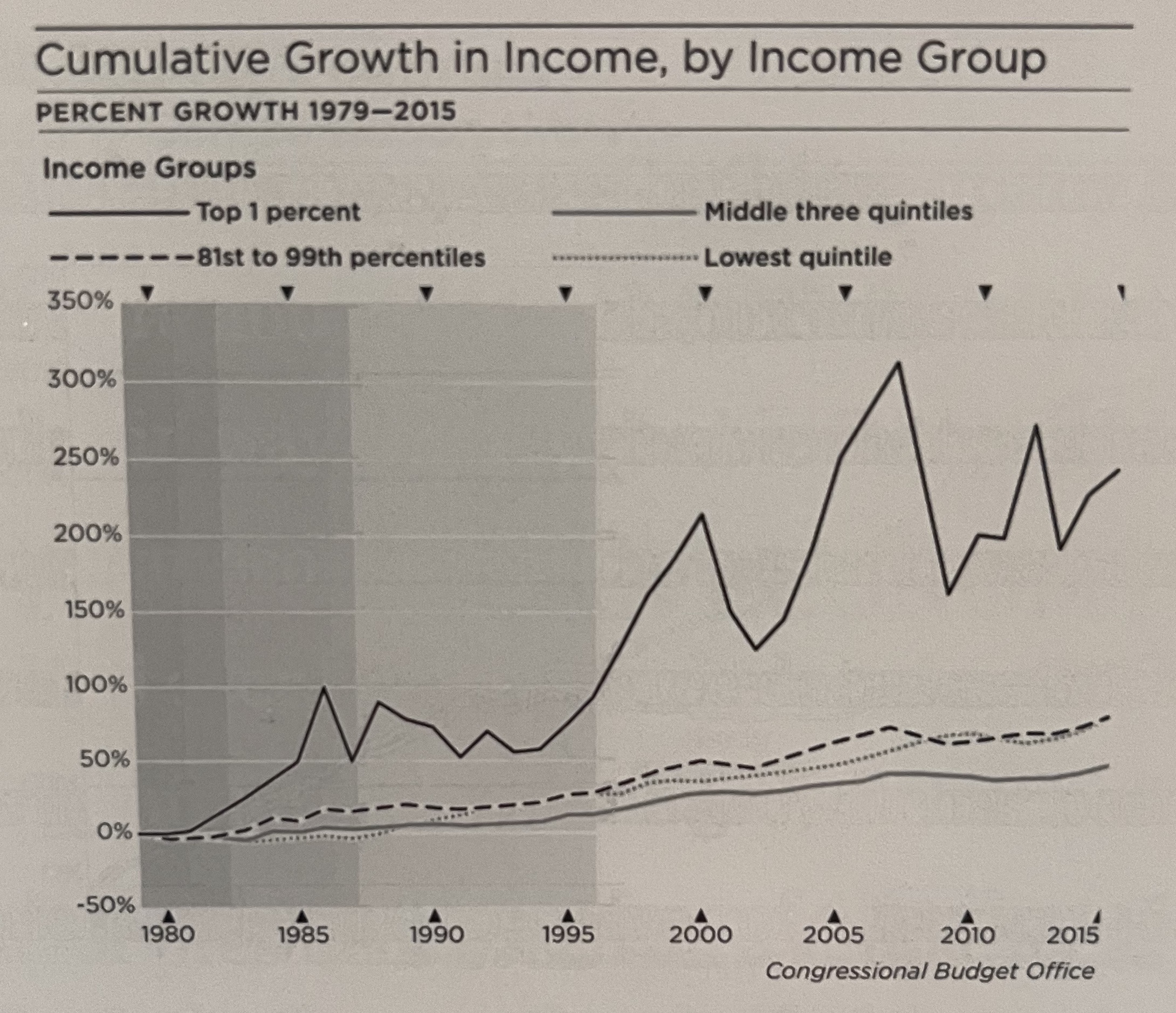🌱 Forward
By: Andrew Yang
Finished 2021-12-24
those who believe that our politics are broken are wrong. Politics is functioning exactly as our structural incentives demand. The problem is that those demands have nothing to do with improving our lives; more often than not, people get rewarded more for keeping a problem around than for solving it.
ranked-choice voting and open primaries across the country, I consider paramount. These electoral reforms are the skeleton key that will realign our leaders’ political incentives and make so much else possible.
With ranked-choice voting, candidates would need to achieve majority support from all the voters in their district and not just the party primary voters. The duopoly would diminish in both power and intensity.
Bernie looks like the scientist from Back to the Future.
the most important thing was to do a good job for each student. The most powerful growth driver would be a satisfied student telling his or her friend, “Hey, this company did a great job, you should give them a try.” That is the way most businesses operate: if you do a good job and make people happy, then the business grows.
[power] leads one to be rude, more likely to cheat on one’s spouse, less attentive to other people, and less interested in the experiences of others. Does that sound familiar? It turns out that power actually gives you brain damage. This even shows up in brain scans.
Among the powerful in various settings, their impulse to reflect what they are being shown emotionally has been numbed. They similarly lose the ability to put themselves in another person’s shoes. Lord David Owen and Jonathan Davidson called it the “hubris syndrome” -a disorder of the possession of power held over years and with minimal constraint on the leader. Its clinical features include contempt for others, loss of reality, recklessness, and displays of incompetence. Lack of empathy is part of the package.
There are thirty countries with better access to drinking water, thirty-two with better access to quality education and lower rates of children dying, and twenty-six countries where a sixty-year-old can be expected to live longer. This is pretty basic stuff that our society is getting worse at


Yang referencing Try Common Sense by Philip Howard 1960
the decline of responsibility in Washington has been accompanied by a rise in apathy and selfishness in the broader culture…[many Americans] are losing hope of a better future for their children. They don’t matter to Washington, and they know it.
These forces have been building up for decades. While worker productivity has skyrocketed since the 1970s, worker pay has stayed more or less constant. As more and more value has been created, workers have not shared in the gains. On the other hand, the ratio of CEO-to-worker pay rose from 20 to 1 in 1965 to 271 to 1 in 2016.
The chances that an American born in 1990 will earn more than his or her parents are down to 50 percent and declining; in 1940 the same figure was 92 percent.
fake news was six times faster to reach fifteen hundred people than something accurate. This was the case in every subject area-business, foreign affairs, science, and technology.
It seems to be pretty clear that false information outperforms true information
a British newspaper that has been cataloging shootings and deaths for years. The FBI even started to use The Guardian’s reporting as a baseline that significantly increased their previously reported number. James Comey, the head of the FBI at the time, called it “unacceptable” and “embarrassing and ridiculous” that the FBI relied upon The Guardian and similar reporting in The Washington Post to determine how many police violence deaths there were each year.
“When there were peaceful protests for George Floyd, we would cut to something else, ” Pekary told me. “If there were some fire or conflict, we would cut to that and show the footage over and over again.”
The problem is the job itself. It forces skilled journalists to make bad decisions on a daily basis.The model blocks diversity of thought and content because the networks have incentive to amplify fringe voices and events, at the expense of others.…all because it pumps up the ratings. Context and factual data are often considered too cumbersome for the audience
Using less social media than you normally would leads to significant decreases in both depression and loneliness.
On cable news
Our viewers don’t really consider us the news. They come to us for comfort.
If you invest in personalities, strong points of view, criticism, and caricaturing of the other side, the occasional inflammatory or controversial statement, and a clear partisan or ideological bent, then your engagement numbers, ratings, advertising sales, and bargaining power all go up.
GDP
we are the purpose of the economy, not is fuel
If you don’t measure the right things, you won’t solve the right problems…Even the inventor of GDP, Simon Kuznets, said at its invention in 1934 that it was a terrible measure of national well-being and cautioned against using it as such, and here we are riding it into the ground eighty-seven years later.
GDP “does not allow for the health of our children, the quality of their education, or the joy of their play…[I]t measures everything, in short, except that which makes life worthwhile.” We’re like a car spinning our wheels in mud while the driver argues everything is okay because the eighty-seven-year-old speedometer is showing progress.
Americans’ approval of Congress has steadily been declining over time, from highs in the 50s and 6os a couple decades ago to 18-30 percent today. Think about that: three-quarters of Americans disapprove of Congress as a whole, while individual members sport reelection rates of 94 percent.
Healthcare
People can’t leave bad or abusive jobs because they need to keep their health care, and it prevents taking a risk on a move, launching a new career, or starting a small business. It incentivizes businesses calling everyone a contractor or part-timer to avoid having to pay for health insurance that gets more expensive every year. We have parents sitting with feverish kids in emergency room parking lots, wondering how their child’s illness will be “coded” by a hospital bureaucrat because they can’t afford nonemergency care.
Our employer-based system is derived from a World War II-era decision to implement pay caps that led employers to start offering health insurance as a way to attract workers. Connecting health care to employment never made sense, but we keep doubling down on it, creating a bizarre patchwork system that freezes workers in place or fails to cover them during a transition.
Identity Politics
“There are many, many powerful identities lurking in that list, and they are fusing together, stacking atop one another, so a conflict or threat that activates one activates all.”
- Ezra Kein
measuring impacts don’t matter anymore. You can simply argue for your version of reality and aligned media outlets will trumpet and reinforce that narrative to your people. Value statements and virtue signaling have assumed the role of laws and policy for many in the day-to-day back-and-forth of cable news. Instead of achieving results, our leaders are asked to demonstrate the correct moral approach by evincing sadness or anger, invoking certain words and issues, and inveighing against the excesses of the other side. Speaking to a group is now an enormous expression of alignment or allegiance. Neither side can pass laws, so we are reduced to warring languages and symbols.
On taxes
Where is the money now? We need to focus less on the town dentist and more on the Amazons of the world. Right now, our largest and most successful companies are paying next to nothing in taxes. They’re sucking value out of our economy, using our infrastructure and data, and giving little back.
A society should seek to tax things that it wants less of, like cigarette consumption or giant executive bonuses. We don’t want less labor from regular workers—quite the opposite. In taxing people’s labor incomes, we’re putting a tax on the thing we should be trying to encourage most.
On Voiting
more than 80 percent of congressional districts are considered “safe” seats; they are either clearly Republican or clearly Democratic. This is one reason the incumbent reelection rate is so high. It is also one reason why many of our representatives tend toward extremes: they are more worried about being challenged in the primaries than in the general election.
Porter propose a system where party primaries are replaced by a top-five primary that is open to all voters. Candidates could identify themselves with a party or not. The top-five finishers would then go on to the general election.
“The currency of votes has consistently less relative value than the currency of money, 99 explain Katherine Gehl and Michael Porter in their book, The Politics Industry. “The utility of votes has a limited upside (i.e., all you need to win an election is one more vote than your competitor) whereas the utility of money has no limit (i.e., more is always better).” This is particularly true because you can roll over money into future campaigns while you can’t bank votes for a rainy day. Thus, “money in politics gets a great return on investment (ROI) -votes, not so much.”
When there is a major event, like the death of George Floyd or the subsequent protests, we beam into the smartphone camera of someone who is standing in downtown Minneapolis or Portland or Chicago and watch a sixty-second video that we then interpret in different ways, as seen in the comment sections on our social media feeds. This is the fundamental challenge of today’s media: we still assume a news monoculture that hasn’t existed in more than thirty years.
The benefits of ranked-choice voting are profound. You don’t need to worry about any candidate being a spoiler. You can vote however you’d like without worrying about “wasting” a vote. It expresses voter preferences better. The winner has to get 50 percent - something that doesn’t always happen with plurality voting if you have more than two candidates
Yet the most important thing we can do to improve our future is the most personal: to extend a sense of grace and tolerance toward the people who disagree with us or who are different from us in some way-even those who attack us.
If you watch a lot of Fox or MSNBC or listen to conservative radio, you actually get pushed into tribes that are completely distinct from how you might be affected by, say, a tax cut. It’s one reason why some voters seem to “vote against their own interests”; they define their interests based on what their vote says about them rather than what they think their vote will do for them. My appeal -which struck many partisans as ridiculous initially-was to say we should give everyone enough money to get by. The politically disengaged heard this and responded, “Hey, that would help me a lot.” This appeal was initially dismissed because it didn’t fall into an existing group narrative or language structure.